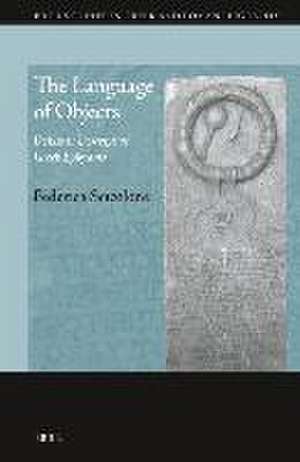The Language of Objects: <i>Deixis</i> in Descriptive Greek Epigrams: Brill Studies in Greek and Roman Epigraphy, cartea 18
Autor Federica Scicoloneen Limba Engleză Hardback – 31 oct 2023
Din seria Brill Studies in Greek and Roman Epigraphy
- 18%
 Preț: 859.57 lei
Preț: 859.57 lei - 18%
 Preț: 844.89 lei
Preț: 844.89 lei - 18%
 Preț: 630.44 lei
Preț: 630.44 lei - 49%
 Preț: 790.92 lei
Preț: 790.92 lei - 18%
 Preț: 653.71 lei
Preț: 653.71 lei - 18%
 Preț: 690.75 lei
Preț: 690.75 lei - 18%
 Preț: 607.66 lei
Preț: 607.66 lei - 18%
 Preț: 577.99 lei
Preț: 577.99 lei - 18%
 Preț: 620.31 lei
Preț: 620.31 lei - 18%
 Preț: 600.53 lei
Preț: 600.53 lei - 18%
 Preț: 679.65 lei
Preț: 679.65 lei - 15%
 Preț: 359.09 lei
Preț: 359.09 lei - 18%
 Preț: 845.86 lei
Preț: 845.86 lei - 18%
 Preț: 722.93 lei
Preț: 722.93 lei - 18%
 Preț: 820.27 lei
Preț: 820.27 lei - 18%
 Preț: 674.27 lei
Preț: 674.27 lei
Preț: 1016.30 lei
Preț vechi: 1239.38 lei
-18% Nou
Puncte Express: 1524
Preț estimativ în valută:
194.50€ • 202.52$ • 164.37£
194.50€ • 202.52$ • 164.37£
Carte disponibilă
Livrare economică 15 februarie-01 martie
Preluare comenzi: 021 569.72.76
Specificații
ISBN-13: 9789004545502
ISBN-10: 9004545506
Pagini: 344
Dimensiuni: 155 x 235 mm
Greutate: 0.76 kg
Editura: Brill
Colecția Brill
Seria Brill Studies in Greek and Roman Epigraphy
ISBN-10: 9004545506
Pagini: 344
Dimensiuni: 155 x 235 mm
Greutate: 0.76 kg
Editura: Brill
Colecția Brill
Seria Brill Studies in Greek and Roman Epigraphy
Notă biografică
Federica Scicolone, Ph.D. (2018), King’s College London, is a Research Fellow in Greek Language and Literature at the University of Pavia. She works primarily on Greek literary and inscribed epigram, and on the interaction between text and context.
Cuprins
Acknowledgments
Preface
List of Abbreviations
List of Figures
Glossary
1 Deixis in Epigram: An Introduction
1.1 Aims and Scope
1.2 History of the Epigrammatic Genre
1.3 Mapping a Tradition: Descriptive Language in Greek Literature
1.4 Literary Review
1.5 A Modern Conceptualisation of Deixis
2 Deixis am Phantasma in Epigrammatic Contexts: Strategies for Interacting with Fictive Frames of Reference
2.1 Literary Epigrams on Famous Works of Art
2.2 Playing with Imagination: Epigrams on Mirror Imaging and Non-existent Objects
Conclusions
3 Ocular Deixis: Strategies for Interacting with Real-Life Material Contexts
3.1 Ocular Deixis in Hellenistic Epigrams
3.2 Ocular Deixis in the Epigrams from the House of the Epigrams and the ‘House of Propertius’
3.3 Ocular Deixis in Greek Epigrams from the Imperial Period
Conclusions
4 Deictic Displacement in Descriptive Epigrams from Late Antiquity
4.1 Displacement and Visuality in Late Antiquity
4.2 Talk of θαῦμα in Descriptive Displaced Epigrams
4.3 Talk of κλέος in Funerary Contexts
4.4 Talk of Materials in Displaced Epigrams
Conclusions
5 Conclusion: Is Deixis Just an Analytical Tool?
5.1 A Holistic Approach
5.2 A Model for Future Research
Bibliography
Index Locorum
General Index
Preface
List of Abbreviations
List of Figures
Glossary
1 Deixis in Epigram: An Introduction
1.1 Aims and Scope
1.2 History of the Epigrammatic Genre
1.3 Mapping a Tradition: Descriptive Language in Greek Literature
1.4 Literary Review
1.5 A Modern Conceptualisation of Deixis
2 Deixis am Phantasma in Epigrammatic Contexts: Strategies for Interacting with Fictive Frames of Reference
2.1 Literary Epigrams on Famous Works of Art
2.2 Playing with Imagination: Epigrams on Mirror Imaging and Non-existent Objects
Conclusions
3 Ocular Deixis: Strategies for Interacting with Real-Life Material Contexts
3.1 Ocular Deixis in Hellenistic Epigrams
3.2 Ocular Deixis in the Epigrams from the House of the Epigrams and the ‘House of Propertius’
3.3 Ocular Deixis in Greek Epigrams from the Imperial Period
Conclusions
4 Deictic Displacement in Descriptive Epigrams from Late Antiquity
4.1 Displacement and Visuality in Late Antiquity
4.2 Talk of θαῦμα in Descriptive Displaced Epigrams
4.3 Talk of κλέος in Funerary Contexts
4.4 Talk of Materials in Displaced Epigrams
Conclusions
5 Conclusion: Is Deixis Just an Analytical Tool?
5.1 A Holistic Approach
5.2 A Model for Future Research
Bibliography
Index Locorum
General Index
